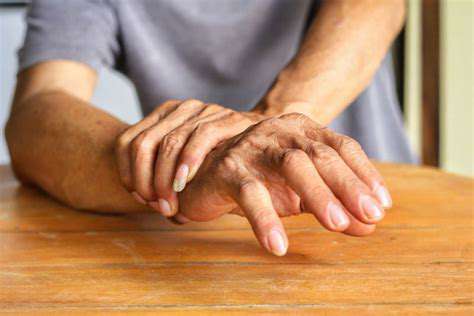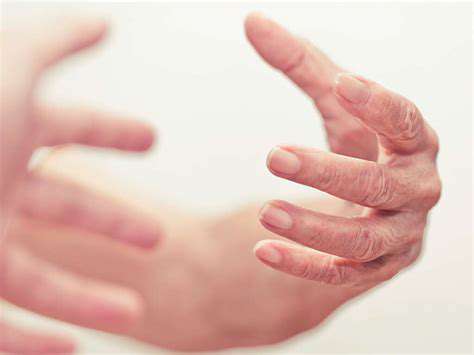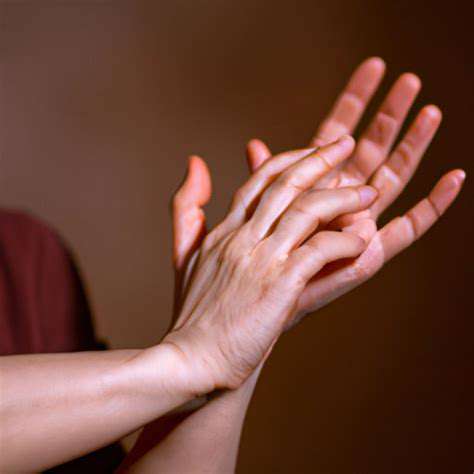Managing Shaky Hands: Causes, Impacts, and Coping Strategies
Common Causes of Shaky Hands

Neurological Disorders
Shaky hands can often be a symptom of underlying neurological disorders. Conditions such as Parkinson's disease, multiple sclerosis, and essential tremor can manifest with tremors in the hands. These disorders affect the nervous system, disrupting normal motor control and coordination. It is crucial to consult a healthcare professional for a proper diagnosis if trembling hands are observed.
In Parkinson's disease, shaking typically starts on one side of the body and can lead to significant mobility issues over time. The tremors may worsen with stress or fatigue, impacting daily activities. Patients often find that coordination becomes increasingly challenging, leading to frustration and anxiety.
Essential tremor is another condition that primarily causes shaking in the hands and arms, especially when performing tasks like writing or drinking. Unlike Parkinson's, essential tremor usually does not worsen with rest but may improve temporarily with alcohol consumption. Recognizing the specific type of tremor is vital for effective management and intervention.
Research indicates that early detection and intervention can help manage the symptoms of neurological disorders. Treatment may involve medications, physical therapy, or lifestyle changes focused on reducing tremor severity.
Medications and Substances
Certain medications can lead to side effects that include shaky hands. Stimulants, antidepressants, and medications for asthma or psychiatric conditions may increase muscle tremors or shakiness. It is important to review medication lists with a healthcare provider to identify potential culprits. Adjusting dosages or switching medications may alleviate these symptoms.
Additionally, withdrawal from substances such as alcohol or benzodiazepines can also result in tremors. Individuals who are accustomed to regular use may experience shaky hands as their body reacts to the absence of these substances. This withdrawal symptom can be distressing and may require medical support.
Excessive caffeine consumption has also been linked to increased hand shakiness. While a moderate amount can provide a boost in energy, too much caffeine may lead to jitteriness and tremors. Being mindful of caffeine intake can be a simple yet effective coping strategy.
Ultimately, being aware of the relationship between medications and trembling hands can empower individuals to seek help. Consulting with a healthcare professional can guide individuals in managing their symptoms effectively.
Emotional and Psychological Factors
Stress and anxiety are significant contributors to shaky hands. When individuals experience high levels of stress, their body's fight-or-flight response activates, leading to tremors. This physiological response can be particularly pronounced during public speaking or other anxiety-inducing situations. Understanding this connection can help individuals develop strategies to manage stress effectively.
People may also experience shaky hands as a result of panic attacks, which can include a range of symptoms beyond trembling. These episodes can be incredibly debilitating and may require therapeutic intervention for management. Techniques such as deep breathing, mindfulness, and meditation may prove beneficial.
Social situations can exacerbate feelings of anxiety, leading to increased tremors. Individuals may feel self-conscious about their shaky hands, creating a cycle of embarrassment and heightened anxiety. Support from friends, family, or mental health professionals can assist in breaking this cycle.
Overall, addressing emotional and psychological factors is key to managing shaky hands. Therapy, cognitive behavioral techniques, and support groups can equip individuals with tools to navigate their challenges more effectively.
Lifestyle Modifications and Coping Strategies
Implementing lifestyle changes can greatly benefit individuals experiencing shaky hands. Regular exercise is crucial, as it can help alleviate symptoms of anxiety and improve overall muscle control. Activities like yoga, tai chi, and strength training not only boost fitness levels but also enhance coordination and balance.
Diet plays an important role as well. Consuming a balanced diet rich in antioxidants, vitamins, and minerals can support nervous system health. Staying hydrated and limiting caffeine and sugar can also help reduce instances of shaky hands.
Establishing a routine can provide structure and reduce anxiety, allowing individuals to feel more in control of their symptoms. This predictability can be comforting and help minimize stress triggers that exacerbate shaking. Setting small, achievable goals daily can foster a sense of accomplishment.
Lastly, seeking support from others can make a significant difference. Connecting with support groups, whether in-person or online, provides individuals with a platform to share their experiences. They can learn from others who face similar challenges and discover new coping strategies.
The Impact of Shaky Hands on Daily Life

The Emotional Toll of Shaky Hands
Living with shaky hands can lead to a range of emotional challenges. Individuals may feel embarrassed or self-conscious about their condition, which can stem from a fear of judgment from others. This embarrassment can also result in social withdrawal, isolating the person from friends and family. It’s common for individuals to experience anxiety or even depression as they grapple with how their condition affects their daily interactions. Overall, the impact on mental health should not be underestimated as it can exacerbate feelings of helplessness.
It's essential for individuals to recognize and address their feelings. Seeking support from mental health professionals can provide strategies to cope with emotional stress. Engaging in open conversations with loved ones about the condition may also help reduce feelings of isolation. Participating in support groups specifically for those with similar conditions can foster a sense of community. Overall, addressing the emotional aspects is crucial for overall well-being.
Practical Challenges Faced by Individuals
Shaky hands can interfere with many daily activities, from simple tasks to more complex ones. Routine tasks, like pouring a cup of coffee or writing, can become frustrating and lead to spills or mistakes. It can also make personal grooming activities, such as shaving or applying makeup, significantly more challenging. These difficulties can affect one’s self-esteem and confidence.
In professional environments, individuals with shaky hands might find it hard to perform tasks that require precision. Employment opportunities could be limited in fields that demand fine motor skills. Learning to adapt to these challenges and finding suitable tools, like weighted utensils or adaptive devices, can improve daily functionality. Being open about one's condition in the workplace may also lead to accommodations that provide support.
Coping Strategies to Manage Shaky Hands
Exploring various coping strategies can significantly alleviate the challenges posed by shaky hands. Engaging in physical therapy exercises tailored specifically to improve muscle control may lead to positive outcomes. Practicing mindfulness and relaxation techniques, such as deep breathing, can also be beneficial. These methods help reduce overall tension, which may in turn lessen the severity of shaking.
Adapting one’s environment is another effective strategy. Utilizing tools designed for individuals with limited motor control, like pens with grips or specialized utensils, can help mitigate difficulties. Additionally, developing a consistent routine can aid in building confidence and reducing anxiety related to unpredictable tremors. These small adjustments contribute to a more manageable daily life.
When to Seek Professional Help
It's essential to recognize when professional help is necessary for managing shaky hands. If the tremors interfere significantly with daily life or cause considerable distress, consulting a healthcare professional is advisable. Medical experts can offer a diagnosis and potential treatment plans tailored to individual needs. This may include medication, therapy, or even lifestyle adjustments aimed at reducing symptoms.
Moreover, keeping a journal to track the frequency and intensity of the shaking can provide valuable insights to health providers. This documentation can highlight potential triggers, whether they are stress-related, environmental, or dietary. Early intervention often leads to better outcomes, making it important to address emerging concerns promptly. Understanding that one is not alone in this experience can spark motivation to seek help and find effective solutions.
Coping Strategies for Shaky Hands

Coping Mechanisms for Everyday Activities
Many individuals with shaky hands often find that simple tasks become challenging. Using adaptive tools can greatly improve everyday experiences. For instance, utensils with larger, non-slip grips can provide better control during meals. Additionally, weighted items, like pens or cooking utensils, can help stabilize movements. It is beneficial to explore various products designed specifically for this issue.
Another effective approach is to modify the way one performs tasks. For example, using both hands for stability can assist in managing tremors while writing or handling objects. Practicing mindfulness techniques can also enhance concentration, reducing the impact of shaking on daily life. This can be as simple as taking deep breaths before starting a challenging task.
Finding a comfortable environment can also make a significant difference. Reducing distractions and maintaining a calm setting helps manage the anxiety that may accompany shaky hands. Over time, developing customized strategies tailored to specific activities will foster greater independence.
Social support plays a vital role in coping with shaky hands. Engaging with support groups or online communities allows individuals to share experiences and practical tips. Building a network of understanding friends and family can bolster self-confidence in daily tasks.
Lastly, practicing patience is essential. Overcoming the challenges of shaky hands won’t happen overnight, but small victories can build confidence over time.
Health and Wellness Considerations
Understanding the underlying causes of shaky hands is crucial for managing them effectively. Conditions such as essential tremor or Parkinson's disease may require specific medical attention. Consulting with healthcare providers can lead to tailored treatment options and insights.
Incorporating regular exercise into one’s routine can also mitigate some symptoms. Physical activity strengthens muscles and promotes overall well-being, which might indirectly ease shaking. Activities like yoga or tai chi focus on control and balance, further benefitting those with tremors.
Nutrition plays a significant role as well. Consuming a balanced diet rich in vitamins and minerals can enhance nerve health, potentially reducing the severity of trembling. Staying hydrated and avoiding excessive caffeine can help maintain stable hand movements.
Additionally, understanding medication interactions is important. Some drugs may exacerbate tremors, so discussing current medications with a doctor is advisable. Exploring alternative treatments, such as acupuncture or meditation, could also be beneficial.
Finally, maintaining good sleep hygiene can positively impact overall health. Proper rest not only boosts energy but also reduces the body's stress response, which can lessen the severity of tremors during the day.
Emotional and Psychological Support Strategies
Living with shaky hands can be emotionally taxing, leading to frustration and low self-esteem. It is essential to acknowledge these feelings and seek appropriate support. Therapy, whether individual or group-based, can provide coping tools and foster resilience.
Mindfulness and relaxation techniques can alleviate stress and anxiety that may arise from managing tremors. Techniques such as meditation, deep breathing, or journaling can contribute to a more positive outlook. Practicing these strategies regularly encourages emotional balance and a better response to challenges.
Engaging in hobbies that don’t rely heavily on fine motor skills can promote a sense of accomplishment and joy. Creative outlets such as painting, music, or even gardening can be fulfilling and therapeutic. Finding activities that boost self-expression can enhance overall mental wellness.
Support from loved ones is invaluable. Open discussions about the challenges faced can create empathy and understanding within relationships. Letting others know what to expect can alleviate some of the burdens associated with shaky hands.
Lastly, focusing on one’s strengths rather than limitations is crucial. Celebrating small achievements encourages a more positive mindset. Emphasizing personal growth rather than just the challenges of shaky hands can lead to a richer, more fulfilling life.